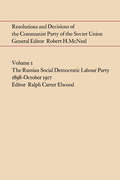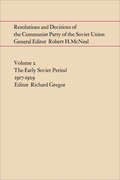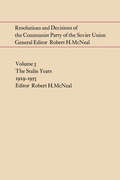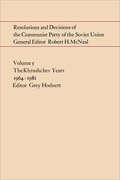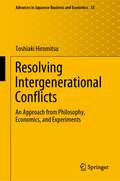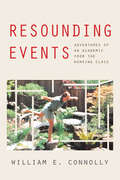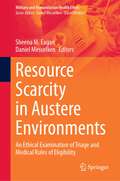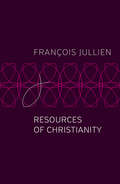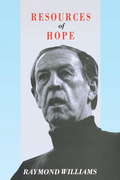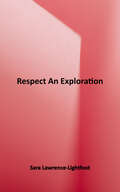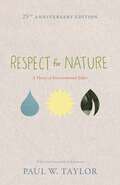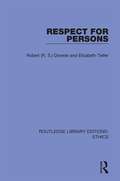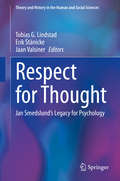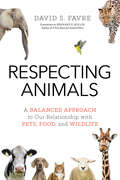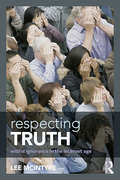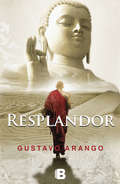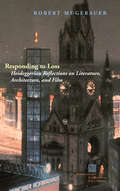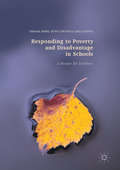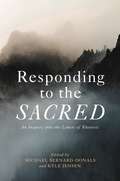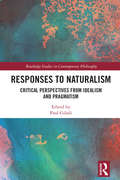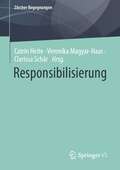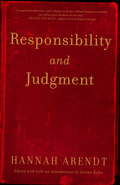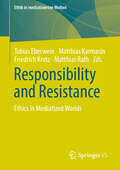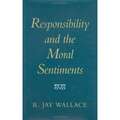- Table View
- List View
Resolutions and Decisions of the Communist Party of the Soviet Union Volume 1: The Russian Social Democratic Labour Party 1898-October 1917
by Ralph ElwoodThis set of four volumes is an indispensable reference work for the study of modern Russia in general and Soviet Communism in particular. Ever since its foundation on the eve of the twentieth century, the organization now called the Communist Party of the Soviet Union has been embodying its major policies in documents called 'resolutions and decisions.' These form a much more continuous and extensive record of the evolution of Soviet Communism than the writings of any single leader, and the standard Soviet anthology of these materials has gone through eight editions over a fifty-year period. Yet most of this essential material has been available only in Russian, and even in that language the standard editions have been marred by selectivity and editorial comment that is often politically motivated. At last students of modern Russian studies have access to a multi-volume work that not only presents the most important Communist Party resolutions and decisions in English, but also amplifies the standard Soviet anthology in important respects and provides editorial explanation that is independent of Kremlin politics. The rich store of materials in these four volumes ranges from the formation of the party to the fall of Khrushchev, and it deals with a wide range of issues. The clearly organized volumes each contain a major introductory essay as well as shorter background essays on each party congress, conference or Central Committee plenum. The documents approved by these meetings are often fundamental in importance, but the centralist operation of the party in power has been such that many of the most vital decisions have been issued in the name of the Central Committee when there was no meeting of that body at all. It is one of the signal achievements of these volumes that the selection of materials included was based on a list of all known part decisions, whether or not they have been included in the main Soviet reference work. The four volumes in this series are edited as an integral set. Each contains a subject index in which Russian abbreviations and acronymic names are translated. Tables summarizing the personnel of the main party executive bodies since 1917 are also provided. At the same time each of the volumes is built around a coherent period in the development of Russian Communism, and each reflects the special features of its time.Volume 1 treats the period before the October Revolution of 1917. It is the first collection of materials on the early evolution of the Russian Social Democratic Party that deals with the entire movement, so that the interaction of the various factions of the party may be understood as a whole and not merely in a partisan Leninist framework. This volume also breaks new ground in publishing in English vital records of Communist activity during the Revolution of 1917.
Resolutions and Decisions of the Communist Party of the Soviet Union Volume 2: The Early Soviet Period 1917-1929
by Richard GregorThis set of four volumes is an indispensable reference work for the study of modern Russia in general and Soviet Communism in particular. Ever since its foundation on the eve of the twentieth century, the organization now called the Communist Party of the Soviet Union has been embodying its major policies in documents called 'resolutions and decisions.' These form a much more continuous and extensive record of the evolution of Soviet Communism than the writings of any single leader, and the standard Soviet anthology of these materials has gone through eight editions over a fifty-year period. Yet most of this essential material has been available only in Russian, and even in that language the standard editions have been marred by selectivity and editorial comment that is often politically motivated. At last students of modern Russian studies have access to a multi-volume work that not only presents the most important Communist Party resolutions and decisions in English, but also amplifies the standard Soviet anthology in important respects and provides editorial explanation that is independent of Kremlin politics. The rich store of materials in these four volumes ranges from the formation of the party to the fall of Khrushchev, and it deals with a wide range of issues. The clearly organized volumes each contain a major introductory essay as well as shorter background essays on each party congress, conference or Central Committee plenum. The documents approved by these meetings are often fundamental in importance, but the centralist operation of the party in power has been such that many of the most vital decisions have been issued in the name of the Central Committee when there was no meeting of that body at all. It is one of the signal achievements of these volumes that the selection of materials included was based on a list of all known part decisions, whether or not they have been included in the main Soviet reference work. The four volumes in this series are edited as an integral set. Each contains a subject index in which Russian abbreviations and acronymic names are translated. Tables summarizing the personnel of the main party executive bodies since 1917 are also provided. At the same time each of the volumes is built around a coherent period in the development of Russian Communism, and each reflects the special features of its time. Volume 2 deals with the period from the October Revolution to the establishment of Stalin's regime. Documents from this period emphasize the transformation of the party into a new kind of bureaucratized authority, controlling such areas as the press, trade unions, armed forces, and youth organization. Factionalism within the party and its suppression are a major theme. The volume opens with the documents (previously unavailable in English) concerning Lenin's crisis of control within the Central Committee shortly after the seizure of power, and it goes on to provide extensive material on both Lenin's and Stalin's suppression of critical groups within the party.
Resolutions and Decisions of the Communist Party of the Soviet Union, Volume 3: The Stalin Years 1929-1953
by Robert McnealThis set of four volumes is an indispensable reference work for the study of modern Russia in general and Soviet Communism in particular. Ever since its foundation on the eve of the twentieth century, the organization now called the Communist Party of the Soviet Union has been embodying its major policies in documents called 'resolutions and decisions.' These form a much more continuous and extensive record of the evolution of Soviet Communism than the writings of any single leader, and the standard Soviet anthology of these materials has gone through eight editions over a fifty-year period. Yet most of this essential material has been available only in Russian, and even in that language the standard editions have been marred by selectivity and editorial comment that is often politically motivated. At last students of modern Russian studies have access to a multi-volume work that not only presents the most important Communist Party resolutions and decisions in English, but also amplifies the standard Soviet anthology in important respects and provides editorial explanation that is independent of Kremlin politics. The rich store of materials in these four volumes ranges from the formation of the party to the fall of Khrushchev, and it deals with a wide range of issues. The clearly organized volumes each contain a major introductory essay as well as shorter background essays on each party congress, conference or Central Committee plenum. The documents approved by these meetings are often fundamental in importance, but the centralist operation of the party in power has been such that many of the most vital decisions have been issued in the name of the Central Committee when there was no meeting of that body at all. It is one of the signal achievements of these volumes that the selection of materials included was based on a list of all known part decisions, whether or not they have been included in the main Soviet reference work. The four volumes in this series are edited as an integral set. Each contains a subject index in which Russian abbreviations and acronymic names are translated. Tables summarizing the personnel of the main party executive bodies since 1917 are also provided. At the same time each of the volumes is built around a coherent period in the development of Russian Communism, and each reflects the special features of its time. Volume 3 treats the Stalin era, the early phase of which witnessed a new degree of party intervention in agriculture, industry, and cultural affairs. The ambivalent relation between the party and Stalin's great purge emerges in party decisions of the later thirties, including an archival document never published in the Soviet Union and some little known material on the Central Committee plenum of February-March 1937. The Zhdanov campaign in the arts following the World War is also represented by the party resolutions translated in this volume.
Resolutions and Decisions of the Communist Party of the Soviet Union Volume 5: The Brezhnev Years 1964-1981
by Donald SchwartzThis set of four volumes is an indispensable reference work for the study of modern Russia in general and Soviet Communism in particular. Ever since its foundation on the eve of the twentieth century, the organization now called the Communist Party of the Soviet Union has been embodying its major policies in documents called 'resolutions and decisions.' These form a much more continuous and extensive record of the evolution of Soviet Communism than the writings of any single leader, and the standard Soviet anthology of these materials has gone through eight editions over a fifty-year period. Yet most of this essential material has been available only in Russian, and even in that language the standard editions have been marred by selectivity and editorial comment that is often politically motivated. At last students of modern Russian studies have access to a multi-volume work that not only presents the most important Communist Party resolutions and decisions in English, but also amplifies the standard Soviet anthology in important respects and provides editorial explanation that is independent of Kremlin politics. The rich store of materials in these four volumes ranges from the formation of the party to the fall of Khrushchev, and it deals with a wide range of issues. The clearly organized volumes each contain a major introductory essay as well as shorter background essays on each party congress, conference or Central Committee plenum. The documents approved by these meetings are often fundamental in importance, but the centralist operation of the party in power has been such that many of the most vital decisions have been issued in the name of the Central Committee when there was no meeting of that body at all. It is one of the signal achievements of these volumes that the selection of materials included was based on a list of all known part decisions, whether or not they have been included in the main Soviet reference work. The four volumes in this series are edited as an integral set. Each contains a subject index in which Russian abbreviations and acronymic names are translated. Tables summarizing the personnel of the main party executive bodies since 1917 are also provided. At the same time each of the volumes is built around a coherent period in the development of Russian Communism, and each reflects the special features of its time. Volume 5 covers Brezhnev's consolidation of power; the limits set on his rule are traced through leadership changes, institutional reforms, and policy development. The major industrial reforms, and policy development. The major industrial and agricultural reforms introduced under Brezhnev are documented, as are the struggle to implement the reforms, the resistance of managerial elites and workers, and Brezhnev's attempt to modernize the Soviet economy and improve levels of efficiency and productivity. Internal party changes reflecting the stable oligarchy that emerged after Khrushchev's removal are included, as well as Brezhnev's commitment to security of tenure for cadres and the changing nature and role of the purge. Party efforts to upgrade recruitment procedures, to change the qualitative composition of the party, to improve the procedures for ensuring routinization and responsiveness in the conduct of party business, and to upgrade the party education system are also documented. Evidence is provided of the party's struggle with corruption in the Georgian Republic and the regime's inability to cope effectively with the widespread growth of social problems. The volume conveys the flavour of oligarchic and bureaucratic politics that emerged with Brezhnev's style of leadership.
Resolving Intergenerational Conflicts: An Approach from Philosophy, Economics, and Experiments (Advances in Japanese Business and Economics #33)
by Toshiaki HiromitsuThis book is an unprecedented consideration of the challenges of what we can do for generations yet to come. Many growing intergenerational conflicts of interest, such as climate change and fiscal sustainability, are the result of the historically new progress of increasing human power, and the resolution of those conflicts demands a new intergenerational ethic. The book offers fresh new ideas for resolving intergenerational conflicts through the exploration of an entirely new field, conceptualized in philosophy, developed in economics, and tested in experiments. In particular, this work develops the theory of intergenerational cooperation based on a new relationship of direct reciprocity between generations. From experimental results, the possibility of intergenerational cooperation through Kantian categorical imperative is shown. The book also examines the effectiveness of inviting representatives of future generations, which are called "imaginary future generations", into the deliberations for current policy decisions. The original Japanese edition of this book was awarded the 66th Nikkei Prize for Excellent Books in Economic Science. The prize was established in 1958 to contribute to the advancement of academics and knowledge in the fields of economics, management, and accounting, as well as to its general dissemination and application.
Resounding Events: Adventures of an Academic from the Working Class
by William E. ConnollyIn Resounding Events, one of the world’s preeminent political theorists reflects on a career as an academic hailing from the working class. From youthful experiences of McCarthyism, to the resurgence of white evangelicalism, to the advent of aspirational fascism and the acceleration of the Anthropocene, Connolly traces a career spent passionately engaged in making a more just, diverse, and equitable world. He surveys the shifting ground upon which politics can be pursued; and he discloses how to be an intellectual in universities that today do not encourage that practice.Far more than a memoir, Resounding Events probes the concerns that have animated Connolly’s work across more than a dozen books by tracing the bumpy imbrications of event, memory and thinking in intellectual life. Connolly experiments with ways to capture various voices that mark a self at any time. An event, as he elaborates it, is what disturbs or inspires thinking as it activates layered sheets of memory. A memory sheet itself assembles recollections, dispositions organized from the past, and vague remains that carry efficacies.Resounding Events shows how resonances between event and memory can help forge new concepts better adjusted to an emergent situation. Addressing tensions between working class experience and norms of the academy, his father’s coma, antiwar protests, the growing disaffection of the white working class, the neoliberalization of the university, climate denialism, and his sister’s experience with workers shifting to Trump, Connolly shows how engaged intellectuals become worthy of the events they encounter.
Resource Scarcity in Austere Environments: An Ethical Examination of Triage and Medical Rules of Eligibility (Military and Humanitarian Health Ethics)
by Sheena M. Eagan Daniel MesselkenThis book focuses on resource allocation in military and humanitarian medicine during times of scarcity and austerity. It is in these times that health systems bend, break, and even collapse and where resource allocation becomes a paramount concern and directly impacts clinical decision-making. Such times are challenging and this book covers this very important, yet, scarcely researched topic within the field of bioethics. This work brings together experts and practitioners in the fields of military health care, philosophy, ethics, and other disciplines to provide analysis on a variety of related topics ranging from case studies and first-hand experiences to policy and philosophical analysis. It is of great interest to to academics, practitioners, policy makers and students who are looking for analyses and guidance regarding the fair provision of medical care and the use of medical rules of eligibility under adverse conditions.
Resources of Christianity
by François JullienChristianity is bound up with the very idea of the West: we cannot evade it even if we would like to. While many people no longer believe in Christianity, we cannot deny that it has left a deep imprint on Western thought. But how might we develop a philosophy of Christianity that is not a Christian philosophy? How can we take a view that is external to the traditions of apologetics and criticism? For there is a question that concerns us all here: are the coherences of Christianity still useful for thought, and especially for thought about existence? To address this question, François Jullien considers Christianity as constituting a set of resources. Resources are available to all and can be used by those who discover and exploit them; they belong to no one. Christianity offers us resources inasmuch as we can draw some benefit from it, inasmuch as it can be the source of an effect, without our having to believe it or determine its truth in advance. Jullien reads the Gospels, and especially the Gospel of John, as he would read any other text, seeking to account for the text's coherence (rather than its ‘meaning’), seeking to account for its pertinence (rather than its ‘truth’), but without any need to adhere – the exploitation of resources demands no conversion. And in reading the Gospel of John in this way, we discover the fertile veins of a theory of existence. This fresh and erudite reflection on Christianity will be of great value to anyone interested in religion and its relevance today.
Resources of Hope
by Raymond WilliamsCollected essays and talks from one of Britain's great thinkers, ranging across political and cultural theory Raymond Williams possessed unique authority as Britain's foremost cultural theorist and public intellectual. Informed by an unparalleled range of reference and the resources of deep personal experience, his life's work represents a patient, exemplary commitment to the building of a socialist future. This book brings together important early writings including "Culture is Ordinary," "The British Left," "Welsh Culture" and "Why Do I Demonstrate?" with major essays and talks of the last decade. It includes work on such central themes as the nature of a democratic culture, the value of community, Green socialism, the nuclear threat, and the relation between the state and the arts. Here too, collected for the first time, are the important later political essays which undertake a thorough revaluation of the principles fundamental to the idea of socialist democracy, and confirm Williams as a shrewd and imaginative political theorist. In a sober yet constructive assessment of the possibilities for socialist advance, Williams--in the face of much recent intellectual fashion--powerfully reasserts his lifelong commitment to "making hope practical, rather than despair convincing. " This valuable collection confirms Raymond Williams as a thinker of rare versatility and one of the outstanding intellectuals of our century.
Respect: An Exploration (A\merloyd Lawrence Book Ser.)
by Sara Lawrence-LightfootIn these many-layered and masterfully written portraits, Sara Lawrence-Lightfoot reaches deep into human experience -- from the drama of birth to the solemn vigil before death -- to find the essence of respect. In her moving vision, relayed through powerfully told stories, respect is not the passive deference offered by a superior but an active force that creates symmetry even in unequal relationships. The reader becomes an eyewitness to the remarkable empowering nature of respect, both given and received -- be it between doctor and patient, teacher and student, photographer and subject, and midwife and laboring mother. They will feel it in the reverent attention paid by a minister to the last moments of life and in the Harvard Law School professor's lively curiosity about his student's extracurricular lives. Through the power of her narrative, Sara Lawrence-Lightfoot ultimately makes the reader an intimate partner in her observations of respect linking these varied and intense relationships. A book to be savored and shared, Respect has the power to transform lives.
Respect for Nature: A Theory of Environmental Ethics - 25th Anniversary Edition (Studies in Moral, Political, and Legal Philosophy #51)
by Paul W. TaylorWhat rational justification is there for conceiving of all living things as possessing inherent worth? In Respect for Nature, Paul Taylor draws on biology, moral philosophy, and environmental science to defend a biocentric environmental ethic in which all life has value. Without making claims for the moral rights of plants and animals, he offers a reasoned alternative to the prevailing anthropocentric view--that the natural environment and its wildlife are valued only as objects for human use or enjoyment. Respect for Nature provides both a full account of the biological conditions for life--human or otherwise--and a comprehensive view of the complex relationship between human beings and the whole of nature. This classic book remains a valuable resource for philosophers, biologists, and environmentalists alike--along with all those who care about the future of life on Earth. A new foreword by Dale Jamieson looks at how the original 1986 edition of Respect for Nature has shaped the study of environmental ethics, and shows why the work remains relevant to debates today.
Respect for Persons: A Philosophical Analysis of the Moral, Political and Religious Idea of the Supreme Worth of the Individual Person
by Robert (R. Downie Elizabeth TelferOriginally published in 1969, this book provides a sustained examination of the idea of the individual person as of supreme worth in the language of analytical philosophy. An important contribution to debates in moral philosophy, it will be of use to students in the philosophy of religion and education and to those who are interested in the contribution which philosophical analysis can make to the understanding of traditional moral and political ideas.
Respect for Thought: Jan Smedslund’s Legacy for Psychology (Theory and History in the Human and Social Sciences)
by Tobias G. Lindstad Erik Stänicke Jaan ValsinerThis book explores and provides an overview of the Norwegian psychologist Jan Smedslund's life work on Psycho-logic. His contributions to science have been radical not only in challenging the empirical foundation of psychology, but also in seeking to develop a viable alternative. This book brings together various reflections on his key contributions from the 1960s to the present day. The volume features three chapters by Jan Smedslund, offering his updated views on psychological science and psychotherapy. It also features contributions from several scholars that critically evaluates his legacy. His seminal ideas are discussed, revised and expanded upon and the questions raised are put in relevant historical and interdisciplinary context. Respect for Thought is a valuable resource for psychological researchers, historians of psychology, cultural psychologists, critical psychologists, theoretical psychologists, clinical psychologists and psychotherapists, social scientists, philosophers of psychology, and philosophers of science.
Respecting Animals: A Balanced Approach to Our Relationship with Pets, Food, and Wildlife
by David S. FavreA legal scholar and animal-rights expert argues for a practical approach to using animals respectfully.In this fresh approach to the animal rights debate, a legal scholar and expert on the humane treatment of animals argues for a middle ground between the extreme positions that often receive the most public attention. Professor Favre advocates an ethic of respectful use of animals, which finds it acceptable for humans to use animals within limited boundaries. He looks at various communities where humans and animals interact: homes, entertainment, commercial farms, local wildlife, and global wildlife. Balancing the interests of the animal against the interests of the human actor is considered in detail. The author examines the following questions, among others: Is it ethically acceptable to shoot your neighbor's dog for barking hours on end? Is it ethical for a zoo to keep a chimpanzee in an exhibit? Is it ethical to eat the meat of an animal? Finally, he discusses how good ethical outcomes can best be transported into the legal system. The author suggests the creation of a new legal category, living property, which would enhance the status of animals in the legal system. This thoughtful, well-argued, and elegantly written book provides readers with a comprehensive and practical context in which to consider their personal and social relationships with animals.
Respecting Truth: Willful Ignorance in the Internet Age
by Lee McIntyreThroughout history, humans have always indulged in certain irrationalities and held some fairly wrong-headed beliefs. But in his newest book, philosopher Lee McIntyre shows how we've now reached a watershed moment for ignorance in the modern era, due to the volume of misinformation, the speed with which it can be digitally disseminated, and the savvy exploitation of our cognitive weaknesses by those who wish to advance their ideological agendas. In Respecting Truth: Willful Ignorance in the Internet Age, McIntyre issues a call to fight back against this slide into the witless abyss. In the tradition of Galileo, the author champions the importance of using tested scientific methods for arriving at true beliefs, and shows how our future survival is dependent on a more widespread, reasonable world.
Resplandor
by Gustavo ArangoLa historia de un viaje que cambiará tu vida. A finales del siglo cuarto (399 d. C.), el monje chino Fa Hsien emprendió uno de los viajes más asombrosos de que se tenga noticia. Partió de Chang-han y, en compañía de otros monjes, se dirigió a la India en busca de los libros de disciplina del budismo. Los monjes bordearon la región del Tibet, atravesaron el desierto y siguieron hacia el Oeste, hasta lo que hoy son Afganistán y Pakistán. Luego descendieron a la región norte de la India y sur del Himalaya. Allí visitaron los lugares donde mil años atrás había transcurrido la vida de Siddhartha Gautama, el Buda.
Responding to Loss
by Robert MugerauerMuch recent philosophical work proposes to illuminate dilemmas of human existence with reference to the arts and culture, often to the point of submitting particular works to preconceived formulations. In this examination of three texts that respond to loss, Robert Mugerauer responds withclose, detailed readings that seek to clarify the particularity of the intense force such works bring forth. Mugerauer shows how, in the face of what is irrevocably taken away as well as of what continues to be given, the unavoidable task of interpretation is ours alone. Mugerauer examines works in three different forms that powerfully call on us to respond to loss: Cormac McCarthy's The Crossing, Daniel Libeskind's Jewish Museum Berlin, and Wim Wenders's film Wings of Desire. Explicating these difficult but rich works with reference to the thought of MartinHeidegger, Jean-Luc Marion, Hannah Arendt, and Emmanuel Levinas, the author helps us to experience the multiple and diverse ways in which all of us are opened to the saturated phenomena of loss, violence, witnessing, and responsibility.
Responding to Poverty and Disadvantage in Schools
by Tamara Bibby Ruth Lupton Carlo RaffoThis book explores a range of challenges teachers face in dealing with situations of disadvantage, and explores different ways of thinking about these situations. Starting with a variety of incidents written by teachers in schools in disadvantaged settings, the book provides a range of ways of thinking about these - some more psychological, others more sociological - and chapters develop conversations between teachers and academics. These 'conversations' will help teachers reflect more deeply on the contexts in which they work, on what disadvantage means, and how disadvantage manifests in practice. It will also help teachers reflect upon the nature of their work; what it means to be a good and effective teacher; and the particular skills, approaches, relationships and competencies that may need to be developed in differing settings of educational disadvantage. The book explores the tensions between different ways of thinking about education and disadvantage; it will make compelling reading for students and teachers of education, education policy makers, and practising schoolteachers.
Responding to the Sacred: An Inquiry into the Limits of Rhetoric
by Michael Bernard-Donals and Kyle JensenWith language we name and define all things, and by studying our use of language, rhetoricians can provide an account of these things and thus of our lived experience. The concept of the sacred, however, raises the prospect of the existence of phenomena that transcend the human and physical and cannot be expressed fully by language. The sacred thus reveals limitations to rhetoric.Featuring essays by some of the foremost scholars of rhetoric working today, this wide-ranging collection of theoretical and methodological studies takes seriously the possibility of the sacred and the challenge it poses to rhetorical inquiry. The contributors engage with religious rhetorics—Jewish, Jesuit, Buddhist, pagan—as well as rationalist, scientific, and postmodern rhetorics, studying, for example, divination in the Platonic tradition, Thomas Hobbes’s and Walter Benjamin’s accounts of sacred texts, the uncanny algorithms of Big Data, and Hélène Cixous’s sacred passages and passwords. From these studies, new definitions of the sacred emerge—along with new rhetorical practices for engaging with the sacred.This book provides insight into the relation of rhetoric and the sacred, showing the capacity of rhetoric to study the ineffable but also shedding light on the boundaries between them.
Responding to the Sacred: An Inquiry into the Limits of Rhetoric
by Michael Bernard-Donals and Kyle JensenWith language we name and define all things, and by studying our use of language, rhetoricians can provide an account of these things and thus of our lived experience. The concept of the sacred, however, raises the prospect of the existence of phenomena that transcend the human and physical and cannot be expressed fully by language. The sacred thus reveals limitations of rhetoric.Featuring essays by some of the foremost scholars of rhetoric working today, this wide-ranging collection of theoretical and methodological studies takes seriously the possibility of the sacred and the challenge it poses to rhetorical inquiry. The contributors engage with religious rhetorics—Jewish, Jesuit, Buddhist, pagan—as well as rationalist, scientific, and postmodern rhetorics, studying, for example, divination in the Platonic tradition, Thomas Hobbes’s and Walter Benjamin’s accounts of sacred texts, the uncanny algorithms of Big Data, and Hélène Cixous’s sacred passages and passwords. From these studies, new definitions of the sacred emerge—along with new rhetorical practices for engaging with the sacred.This book provides insight into the relation of rhetoric and the sacred, showing the capacity of rhetoric to study the ineffable but also shedding light on the boundaries between them.In addition to the editors, the contributors to this volume include Michelle Ballif, Jean Bessette, Trey Conner, Richard Doyle, David Frank, Daniel M. Gross, Kevin Hamilton, Cynthia Haynes, Steven Mailloux, James R. Martel, Jodie Nicotra, Ned O’Gorman, and Brooke Rollins.
Responses to Naturalism: Critical Perspectives from Idealism and Pragmatism (Routledge Studies in Contemporary Philosophy)
by Paul GiladiThis volume offers critical responses to philosophical naturalism from the perspectives of four different yet fundamentally interconnected philosophical traditions: Kantian idealism, Hegelian idealism, British idealism, and American pragmatism. In bringing these rich perspectives into conversation with each other, the book illuminates the distinctive set of metaphilosophical assumptions underpinning each tradition’s conception of the relationship between the human and natural sciences. The individual essays investigate the affinities and the divergences between Kant, Hegel, Collingwood, and the American pragmatists in their responses to philosophical naturalism. The ultimate aim of Responses to Naturalism is to help us understand how human beings can be committed to the idea of scientific progress without renouncing their humanistic explanations of the world. It will appeal to scholars interested in the role idealist and pragmatist perspectives play in contemporary debates about naturalism.
Responsibilisierung (Zürcher Begegnungen)
by Catrin Heite Veronika Magyar-Haas Clarissa SchärDer Band prüft den Begriff Responsibilisierung aus unterschiedlichen disziplinären Perspektiven auf seine Aktualität, sein analytisches Gewicht und seine theoretischen Bedeutungen und bringt so die Erziehungswissenschaft mit der Soziologie, der Philosophie oder der Geschichtswissenschaft ins Gespräch. Es wird sowohl danach gefragt, welche tragfähigen theoretischen, analytischen und politischen Perspektiven mit einer positiven Bezugnahme auf die Begriffe ‹Verantwortung› und ‹Responsibilisierung› verbunden sind, als auch danach, welche Kritiken angemessen erscheinen.
Responsibility and Judgment
by Hannah ArendtBest known as the author of The Origins of Totalitarianism, philosopher Hannah Arendt (1906-1975) spent much of her academic and writing career wrestling with questions of morality. This volume presents unpublished writings from the last decade of Arendt's life examining the nature of evil and moral choice and the connection between judgment and responsibility. Kohn provides background information on Arendt's life and ideas in the introduction. Annotation 2004 Book News, Inc., Portland, OR (booknews.com)
Responsibility and Resistance: Ethics in Mediatized Worlds (Ethik in mediatisierten Welten)
by Tobias Eberwein Matthias Karmasin Friedrich Krotz Matthias RathThe volume deals with the normative challenges and the ethical questions imposed by, and through, the developments and changes in everyday life, culture and society in the context of media change. It is thus concerned with the questions of whether and how the central concept of (enlightened) ethics must evolve under these premises – or in other words: what form do ethics take in mediatized societies? In order to address this question and to stimulate and initiate a debate, the authors focus on two concepts: responsibility and resistance. Their contributions try to shed light not only on the empirical shreds of evidence of change in mediatized societies, but also on the normative challenges and ethical possibilities of these developments.
Responsibility and the Moral Sentiments
by R. Jay WallaceWe need to understand what we are doing when we hold people morally responsible, a stance that Wallace connects with a central class of moral sentiments, those of resentment, indignation and guilt. To hold someone responsible, he argues, is to be subject to these reactive emotions in one's dealings with that person. Developing this theme, he offers an interpretation of the reactive emotions and traces their role in our practices of blame and moral sanction.
